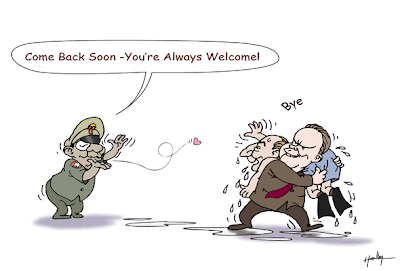The Junta’s New Balancing Act

By HTET AUNG
The Irrawaddy News
John William Yettaw has been released from Burma’s notorious Insein Prison, where hundreds of the country’s political prisoners are currently detained while dozens sacrificed their lives in the past two decades.
The Aung San Suu Kyi intruder is now able to return home, crossing thousands of miles of ocean, not by swimming, but in the comfort of a jet, leaving the innocent victim, Suu Kyi, to serve out her fourth house arrest for another18 months.
The dismal end to the drama couldn’t be more frustrating to the Burmese people who desperately want to see their beloved democracy leader free. She is their hope for freedom under the ruthless military dictatorship.
US Sen Jim Webb may be satisfied with his mission: he accomplished two of his three requests: the release of Yettaw and a meeting with Suu Kyi.
But Sen-Gen Than Shwe is smiling too, because he can now safely carry out the 2010 elections with Suu Kyi safely locked away under house arrest.
Now the junta chief can fully concentrate on a major issue that has the potential to unravel the smooth path to national elections—the unruly ethnic armed ceasefire groups.
Than Shwe has two goals: to transform the ethnic ceasefire groups into a Border Guard Force and to persuade the groups to form political parties in their respective areas and to field candidates in the upcoming election.
So far, Than Shwe has convinced only one group, the Democratic Karen Buddhist Army, to transform into a Border Guard Force, under the command of government officers.
The task must be done in line with the new constitution and its Section 338, which states: “All the armed forces in the Union shall be under the command of the Defense Services.”
However, the most powerful ethnic ceasefire groups have not signed on to the plan, especially the largest groups along Burma’s frontier bordering with China. The United Wa State Army and the Kachin Independence Army, the strongest of the armed ethnic groups, have rejected the government’s order.
They don’t trust the junta. Their common position is they want to deal with this issue after a parliamentary government is formed following the 2010 election.
Although the junta enjoys China’s political support in keeping international pressure at bay, it hasn’t received its neighbor’s support on the border guard issue. Instead, China has pressured the junta to tackle the issue carefully and not to destabilize the border area.
Having successfully drawn India, at one time a strong supporter of Burma’s democracy movement, into its camp by playing a balancing act with China, the junta can now play the same diplomatic game between China and the United States.
If the US decides to practice a more flexible engagement policy, the threat of UN Security Council might be reduced, meaning that it may not need to rely so much on China’s veto in opposing anti-Burmese junta resolutions. That could give the junta more bargaining power in tackling the issue of the armed ethnic groups along the border with China.
If the Obama administration sees Webb’s achievement as a positive step and an opportunity for engagement with the junta, it means the junta has more leverage in playing the two superpowers off one another.
Furthermore, it means a significant diplomatic triumph for the junta to win the official recognition of the US, the generals’ major foe that is often accused of neo-colonialist meddling in the country’s internal affairs.
If not, the junta has nothing to lose. The more it delays the release of Suu Kyi, the more the US might feel responsible for Suu Kyi’s fourth detention, which was triggered by the actions of an American.
But for the time being, the Democratic senator can bask in his accomplishment of snatching Yettaw from the hands of a ruthless junta.
The author is an independent researcher and a graduate in International Development Studies at Chulalongkorn University in Bangkok.










